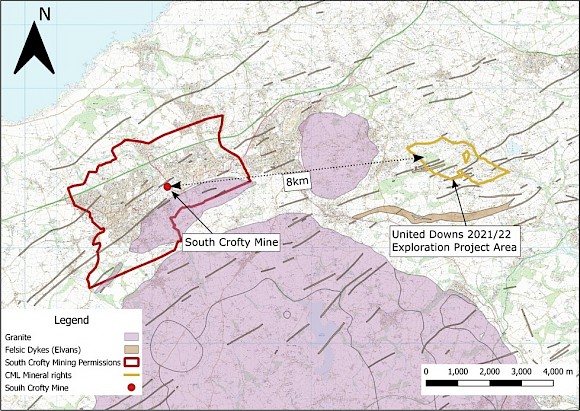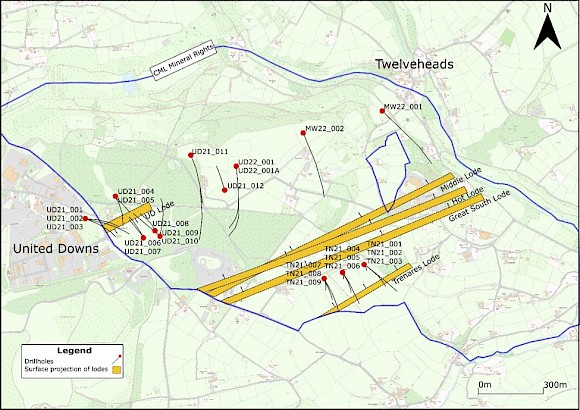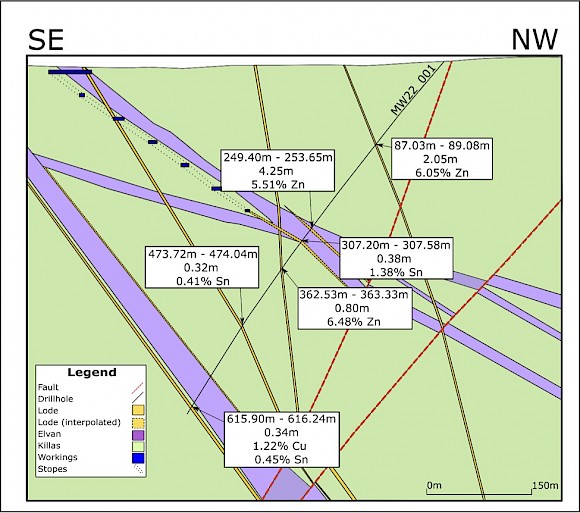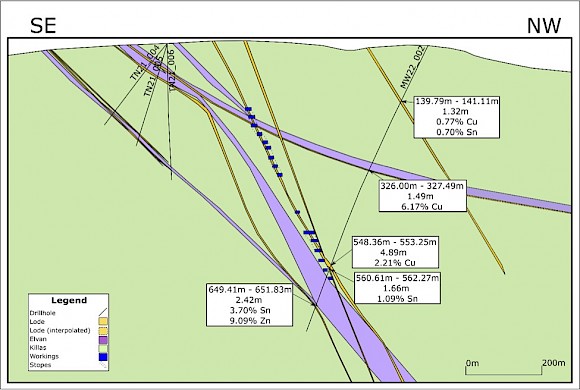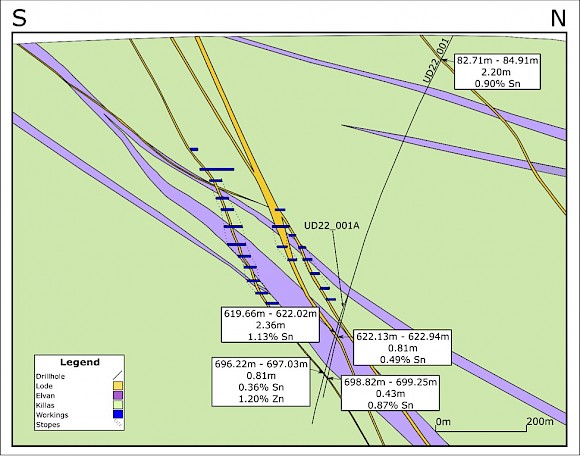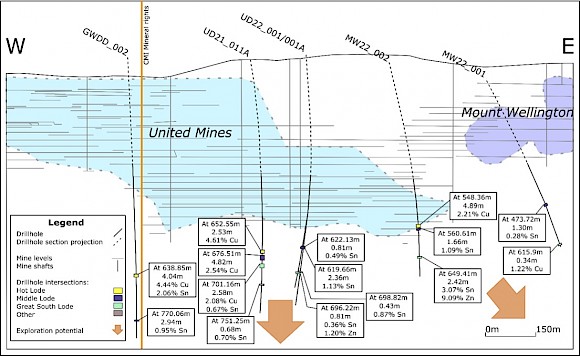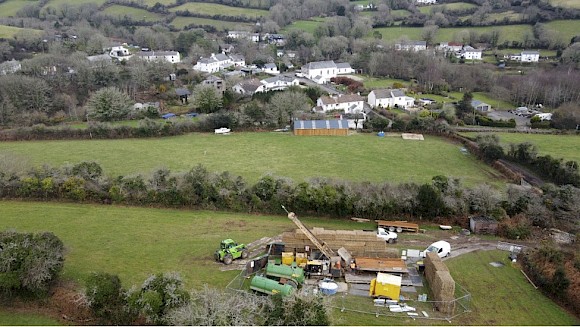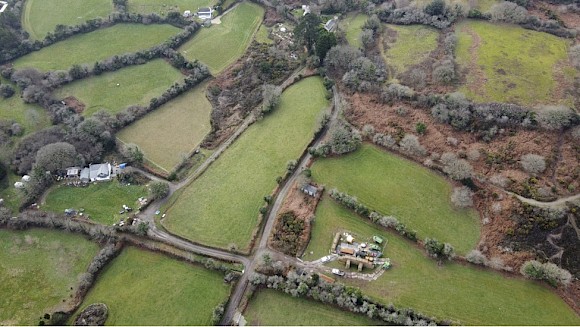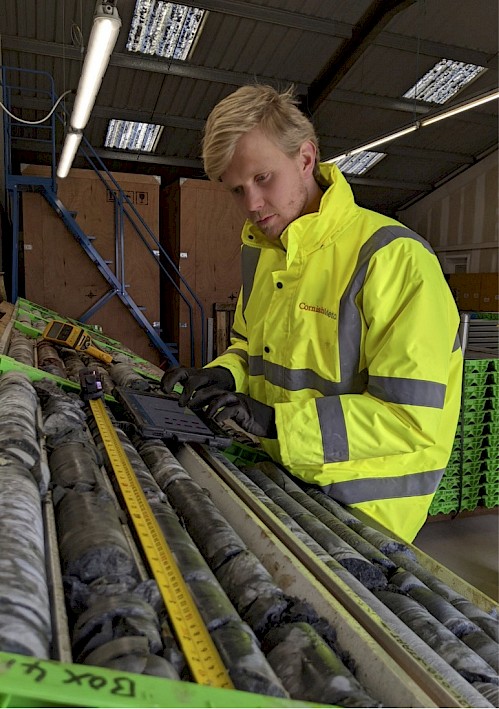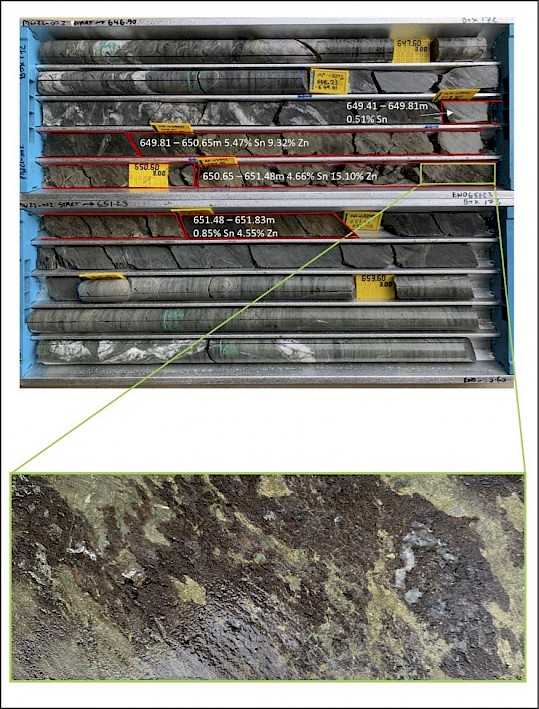Cornish Metals Inc. (TSX-V/AIM: CUSN) (“Cornish Metals” or the “Company”), a dual-listed company focused on advancing the South Crofty high-grade, underground tin project through to delivery of a Feasibility Study, as well as exploring its additional mineral rights, all located in Cornwall, South West England, is pleased to report the remaining assay results from the Phase 1 drill programme at United Downs. This release includes results from the Mount Wellington and United Mines Targets within the United Downs project, located eight kilometres east of South Crofty (Figure 1).
Highlights
- All four of the remaining drill holes intersected multiple mineralised zones (Table 1 below).
- Two drill holes (MW22_001 and MW22_002), totaling 1,334.00 metres (‘m’), were completed at the Mount Wellington Target, testing the down dip extensions of both Mount Wellington Mine (tin – zinc) and United Mines (copper – tin – zinc – silver) (Figure 2).
- Two drill holes (UD22_01 and UD22_01A), totaling 1010.61m, drilled in the central part of United Downs project, tested the down dip extension of United Mines (Figure 2).
- MW22_001 intersected several high-grade zinc zones (see Figure 3 showing a cross section of the geology and the intersects), including;
- 2.05m grading 6.05% zinc from 87.03m;
- 4.25m grading 5.51% zinc from 249.40m, and;
- 0.80m grading 6.48% zinc from 362.53m.
- MW22_002 (Figure 4) intersected several polymetallic zones, including;
- 1.49m grading 6.17% copper, and 67g/t silver from 326.00m;
- 4.89m grading 2.21% copper, and 19g/t silver from 548.36m;
- 1.66m grading 1.09% tin from 560.61m, and;
- 2.42m grading 3.70% tin, and 9.09% zinc from 649.41m.
- The high-grade zinc intersections in MW22_001 require further work to determine continuity along strike and to depth to establish the Mineral Resource potential.
- High grade tin intersects were encountered in UD22_01 and UD22_01A, confirming a potential transition from high grade copper to high grade tin at depth, similar to the mineralisation transition seen at South Crofty Mine (Figure 5).
- High-grade copper and tin intersections beneath United Mines have now been observed over a strike length of approximately 1,350m and the zone is open along strike and to depth (Figure 6).
- The high-grade tin intersects in MW22_002, GWDD_002 (see News Release dated November 17, 2020), UD21_011A (see News Release dated December 6, 2021), UD22_001, UD22_001A, and MW22_002 support management’s belief that tin grades increase with depth, similar to the mineralisation transition seen at South Crofty.
Richard Williams, CEO of the Company, stated “The Phase 1 drill programme at United Downs has been successful on a number of fronts – assay results, safety, community support and drill contractor performance.
“Results from the United Downs drill programme confirm the potential to develop a Mineral Resource, especially the down dip section of the United Mine where we encountered high-grade copper, tin, and silver. The Company is now considering the next steps for United Downs.”
Photographs from the drill programme can be viewed below.
Table 1 – Significant Intersections
|
Hole |
From |
To |
Hole Length (m) |
Length (m) |
Copper (%) |
Tin (%) |
Zinc (%) |
Ag (g/t) |
|
MW22_001 |
87.03 |
89.08 |
623.46 |
2.05 |
0.11 |
0.38 |
6.05 |
8 |
|
And |
249.40 |
253.65 |
|
4.25 |
0.24 |
0.07 |
5.51 |
13 |
|
And |
307.20 |
307.58 |
|
0.38 |
0.21 |
1.38 |
0.26 |
7 |
|
And |
362.53 |
363.33 |
|
0.80 |
0.05 |
0.07 |
6.48 |
9 |
|
And |
473.72 |
474.04 |
|
0.32 |
0.25 |
0.41 |
0.02 |
1 |
|
And |
615.90 |
616.24 |
|
0.34 |
1.22 |
0.45 |
0.04 |
23 |
|
|
|
|
|
|
|
|
|
|
|
MW22_002 |
139.79 |
141.11 |
710.54 |
1.32 |
0.77 |
0.70 |
0.23 |
46 |
|
And |
326.00 |
327.49 |
|
1.49 |
6.17 |
0.08 |
0.53 |
67 |
|
And |
548.36 |
553.25 |
|
4.89 |
2.21 |
0.22 |
0.07 |
19 |
|
Including |
548.36 |
549.30 |
|
0.94 |
5.92 |
0.30 |
0.22 |
56 |
|
And |
560.61 |
562.27 |
|
1.66 |
0.15 |
1.09 |
0.01 |
1 |
|
And |
649.41 |
651.83 |
|
2.42 |
0.38 |
3.70 |
9.09 |
6 |
|
Including |
649.81 |
651.48 |
|
1.67 |
0.28 |
5.07 |
12.19 |
7 |
|
|
||||||||
|
UD22_001 |
82.71 |
84.91 |
745.47 |
2.20 |
0.04 |
0.90 |
0.10 |
1 |
|
And |
622.13 |
622.94 |
|
0.81 |
0.12 |
0.49 |
0.13 |
1 |
|
And |
698.82 |
699.25 |
|
0.43 |
0.01 |
0.87 |
0.02 |
|
|
And |
700.32 |
701.41 |
|
1.09 |
0.06 |
0.92 |
0.01 |
|
|
|
|
|
|
|
|
|
|
|
|
UD22_001A |
619.66 |
622.02 |
800.64* |
2.36 |
0.15 |
1.13 |
0.03 |
|
|
And |
696.22 |
697.03 |
|
0.81 |
0.15 |
0.36 |
1.20 |
1 |
True thickness of encountered structures is estimated to be in the region of 80-90%.
* - UD22_001A was wedged from UD22_001 at a downhole depth of 535.40m
GEOLOGY AND MINERALISATION
The geology at United Downs comprises metasediments (locally termed “killas”), which overlie an intrusive granite body. The historic mines within the area (United Mines, Consolidated Mines, Mount Wellington, and Wheal Jane) exploited copper – tin – zinc – silver mineralisation hosted entirely within killas.
The polymetallic mineralisation is primarily hosted in narrow, steeply dipping vein or “lode” structures, and consists of cassiterite (tin), chalcopyrite (copper) and sphalerite (zinc) with other copper minerals such as chalcocite and bornite occasionally present.
United Mines and Consolidated Mines operated between the early 1700s and the 1870s, mining high-grade copper ores (reported grades of 7.5% copper) to depths of up to 500m below surface.
The Mount Wellington and Wheal Jane mines exploited similar structures located along strike from the historic mining at United Downs, where tin, copper and zinc mineralisation was mined and processed until 1978 and 1991, respectively. Wheal Jane was mined to a depth of approximately 500m below surface whereas Mount Wellington only reached approximately 200m depth before closing. Mount Wellington is located within Cornish Metals’ mineral rights and was still in mineralisation when the mined closed.
TECHNICAL INFORMATION
Drilling at United Downs has been performed by Priority Drilling Company Ltd using an Epiroc Christensen CT14 Diamond Drill Rig. Mineralised zones were drilled in NQ (76 millimetre (‘mm’) diameter) to recover a 48mm diameter drill core. Core recovery was greater than 95%. The core was logged, split, and sampled by Cornish Metals personnel. The samples, comprising half core, were sent for assay at ALS Minerals, Loughrea, Ireland. Sample preparation involved crushing to 70% less than 2mm, riffle split and pulverised to 85% less than 75 microns. The analytical method used for copper, tin, tungsten, zinc and arsenic was X-ray florescence (XRF) following a lithium borate fusion. A multi-element 4 Acid Digestion ICP-AES analysis was also carried out to further characterise the mineralisation and alteration assemblages. Overlimit assays on silver were carried out using a 3-acid digest and a HCl leach ICP AES analysis. Comprehensive Quality Assurance / Quality Control programme using standards, duplicates and blanks was included within the sampling programme.
The technical information in this news release has been compiled by Mr. Owen Mihalop who has reviewed and takes responsibility for the data and geological interpretation. Mr. Owen Mihalop (MCSM, BSc (Hons), MSc, FGS, MIMMM, CEng) is Chief Operating Officer for Cornish Metals Inc. and has sufficient experience relevant to the style of mineralisation and type of deposit under consideration and to the activity which he is undertaking to qualify as a Competent Person as defined under the JORC Code (2012) and as a Qualified Person under NI 43-101. Mr. Mihalop consents to the inclusion in this announcement of the matters based on his information in the form and context in which it appears.
ABOUT CORNISH METALS
The South Crofty project covers the former producing South Crofty tin mine located beneath the towns of Pool and Camborne, Cornwall. South Crofty mine closed in 1998 following over 400 years of continuous production. Since acquiring the project in 2016, Cornish Metals has completed and published maiden NI 43-101 Mineral Resources for South Crofty using the vast archive of historical production data and more recent drilling completed between 2007 and 2013. Additionally, Cornish Metals has undertaken extensive pilot-scale water treatment trials and successfully applied for and received the necessary environmental permits to abstract, treat and discharge mine water in order to dewater the mine. Planning permissions for the operation of the mine and re-development of the surface facilities have been secured and construction of the water treatment plant foundations commenced. The dewatering pumps, variable speed drives and new high-voltage power supply have been delivered to site.
An updated Mineral Resource was completed in June 2021 as summarised below:
|
South Crofty Summary (JORC 2012) Mineral Resource Estimate |
|||||
|
Area |
Classification |
Mass (‘000 tonnes) |
Grade |
Contained Tin / Tin Equivalent (‘000 tonnes) |
Increase in contained Tin / Tin equivalent from 2016 MRE |
|
Lower Mine |
Indicated |
2,084 |
1.59% Sn |
33 |
10.2% |
|
Inferred |
1,937 |
1.67% Sn |
32 |
129.8% |
|
|
|
|||||
|
Upper Mine |
Indicated |
277 |
1.01% SnEq |
3 |
9.5% |
|
Inferred |
493 |
0.93% SnEq |
5 |
8.0% |
|
The Mineral Resource Estimate for South Crofty (see news release dated June 9, 2021), is available in a report titled the “South Crofty Tin Project Mineral Resource Update”, dated June 7, 2021, authored by Mr. N. Szebor, CGeol (London), EuroGeol, FGS, of AMC Consultants (UK) Ltd, can be accessed on the Company’s SEDAR page.
For additional information please contact:
In North America:
Irene Dorsman at (604) 200 6664.
In UK:
SP Angel Corporate Finance LLP Tel: +44 203 470 0470
(Nominated Adviser & Joint Broker) Richard Morrison
Charlie Bouverat
Grant Barker
H & P Advisory Limited Tel: +44 207 907 8500
(Joint Broker) Matthew Hasson
Andrew Chubb
Ernest Bell
BlytheRay Tel: +44 207 138 3204
(Financial PR/IR-London) Tim Blythe tim.blythe@blytheray.com
Megan Ray megan.ray@blytheray.com
ON BEHALF OF THE BOARD OF DIRECTORS
“Richard D. Williams”
Richard D. Williams, P.Geo
Market Abuse Regulation (MAR) Disclosure
The information contained within this announcement is deemed by the Company to constitute inside information pursuant to Article 7 of EU Regulation 596/2014 as it forms part of UK domestic law by virtue of the European Union (Withdrawal) Act 2018 as amended.
Neither the TSX Venture Exchange nor its Regulation Services Provider (as that term is defined in the policies of the TSX Venture Exchange) accepts responsibility for the adequacy or accuracy of this release.
Caution regarding forward looking statements
This news release contains "forward-looking statements". Forward-looking statements, while based on management's best estimates and assumptions at the time such statements are made, are subject to risks and uncertainties that may cause actual results to be materially different from those expressed or implied by such forward-looking statements, including but not limited to: risks related to receipt of regulatory approvals, risks related to general economic and market conditions; risks related to the COVID-19 global pandemic and any variants of COVID-19 which may arise; risks related to the availability of financing; the timing and content of upcoming work programmes; actual results of proposed exploration activities; possible variations in Mineral Resources or grade; failure of plant, equipment or processes to operate as anticipated; accidents, labour disputes, title disputes, claims and limitations on insurance coverage and other risks of the mining industry; changes in national and local government regulation of mining operations, tax rules and regulations.
Although Cornish Metals has attempted to identify important factors that could cause actual results to differ materially from those contained in forward-looking statements, there may be other factors that cause results not to be as anticipated, estimated or intended. There can be no assurance that such statements will prove to be accurate, as actual results and future events could differ materially from those anticipated in such statements. Accordingly, readers should not place undue reliance on forward-looking statements. Cornish Metals undertakes no obligation or responsibility to update forward-looking statements, except as required by law.
Figure 1 – Map showing the location of the United Downs Project in relation to South Crofty Mine
Figure 2 – Plan of drill holes completed at United Downs project
Figure 3 – Cross section of MW22_001
Figure 4 – Cross section of MW22_002
Figure 5 – Cross section of UD22_001/UD22_001A
Figure 6 – Long Section of copper, tin and zinc lode intersections down dip from the historic United Mines and Mount Wellington Mine, drilled during the Cornish Metals 2021/2022 United Downs exploration programme
Photograph showing the drilling of MW22_001 with the village of Twelveheads in the background
Aerial view of drilling at Mount Wellington
Geologist Peter Mogridge logging drill core from the Mount Wellington drillholes
Photograph of drill core from drillhole MW22_002with high grade tin and zinc mineralisation

